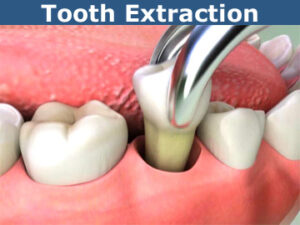Why To Remove Tooth
- Tooth decay: If a tooth is severely decayed and cannot be repaired with a filling or crown, it may need to be extracted to prevent further damage and infection.
- Gum disease: Advanced gum disease can cause the teeth to become loose and eventually fall out or require extraction.
- Impacted wisdom teeth: If the wisdom teeth do not have enough space to grow properly or are causing problems such as pain or infection, they may need to be extracted.
- Overcrowding: If the teeth are overcrowded, one or more teeth may need to be removed to make room for the remaining teeth.
- Infection: If a tooth is infected, it may need to be extracted to prevent the infection from spreading to other teeth or parts of the body.
- Orthodontic treatment: Sometimes teeth need to be removed to make space for braces or other orthodontic treatment.
It's important to consult with your dentist if you have any concerns about a tooth or if you experience any pain or discomfort in your mouth. Your dentist will be able to examine your teeth and recommend the best course of treatment.
Wisdom Teeth Removal
Wisdom teeth, also known as third molars, are the last teeth to emerge in the back of the mouth, typically between the ages of 17 and 25. In many cases, they can cause problems such as pain, infection, and overcrowding, and as a result, they may need to be removed.
If you need to have your wisdom teeth removed, here are some important things to keep in mind:
- Consult with your dentist or oral surgeon: They will examine your teeth and recommend the best course of action. They may recommend a panoramic X-ray to get a clear view of your wisdom teeth and their position in your mouth.
- Preparing for the surgery: Your dentist or oral surgeon will give you instructions on how to prepare for the surgery. This may include instructions on fasting before the surgery, stopping certain medications or supplements, and arranging for someone to drive you home after the procedure.
- The surgery: The surgery itself typically takes about 30-60 minutes, depending on the complexity of the procedure. You will be given anesthesia to ensure that you are comfortable during the procedure.
- Recovery: After the surgery, you will need to rest for a few days. You may experience some swelling, pain, and bleeding, which can be managed with pain medications, ice packs, and gauze. You should also avoid solid foods and stick to soft, easy-to-eat foods for a few days.
- Follow-up: You will need to return to your dentist or oral surgeon for a follow-up appointment to ensure that your mouth is healing properly. They will also provide you with additional instructions on how to care for your mouth during the healing process.
Overall, wisdom teeth removal is a common and relatively safe procedure. If you have any concerns or questions, be sure to talk to your dentist or oral surgeon.
Extraction (Removal) of Tooth

Tooth extraction is a common dental procedure where a tooth is removed from its socket in the jawbone. Here are some important things to keep in mind if you need to have a tooth extraction:
- Consult with your dentist: They will examine your tooth and recommend the best course of action. They may recommend an X-ray to get a clear view of the tooth and its position in your mouth.
- Preparing for the extraction: Your dentist will give you instructions on how to prepare for the extraction. This may include instructions on fasting before the procedure, stopping certain medications or supplements, and arranging for someone to drive you home after the procedure.
- The extraction: The extraction itself typically takes only a few minutes, depending on the complexity of the procedure. You will be given a local anesthetic to numb the area around the tooth, and your dentist may use special tools to loosen the tooth before removing it from the socket.
- Recovery: After the extraction, you will need to rest for a few hours. You may experience some bleeding and pain, which can be managed with pain medications and gauze. You should also avoid solid foods and stick to soft, easy-to-eat foods for a few days.
- Follow-up: You will need to return to your dentist for a follow-up appointment to ensure that your mouth is healing properly. They will also provide you with additional instructions on how to care for your mouth during the healing process.
In some cases, your dentist may recommend a dental implant or bridge to replace the extracted tooth. If you have any concerns or questions, be sure to talk to your dentist.